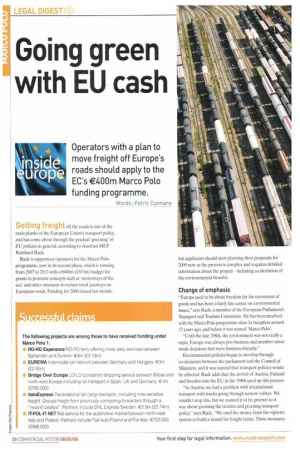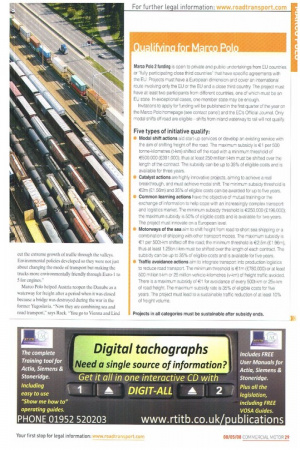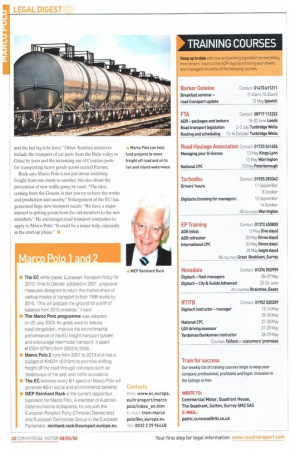Going green with EU cash
Page 28

Page 29

Page 30

If you've noticed an error in this article please click here to report it so we can fix it.
Operators with a plan to move freight off Europe's roads should apply to the EC's €400m Marco Polo funding programme.
Words: Patric Cunnane Getting freight off the roads is one of the main planks of the European Union's transport policy, and has come about through the gradual 'greening' of EU policies in general, according to Austrian MEP Reinhard Rack.
Rack is rapporteur (sponsor) for the Marco Polo programme, now in its second phase, which is running from 2007 to 2013 with a f400m (£313m) budget for grants to promote concepts such as 'motorways of the sea' and other measures to reduce truck journeys on European roads. Funding for 2008 closed last month, but applicants should start planning their proposals for 2009 now as the process is complex and requires detailed information about the project — including a calculation of the environmental benefits.
Change of emphasis
"Europe used to be about freedom for the movement of goods and has been a fairly late corner on environmental issues," says Rack, a member of the European Parliament's Transport and Tourism Committee. He has been involved with the Marco Polo programme since its inception around 12 years ago, and before it was named 'Marco Polo'.
"Until the late 1980s, the environment was not really a topic. Europe was always pro-business and member states made decisions that were business-friendly."
Environmental policies began to develop through co-decisions between the parliament and the Council of Ministers, and it was natural that transport policies would be affected. Rack adds that the arrival of Austria, Finland and Sweden into the EU in the 1980s sped up this process.
"In Austria, we had a problem with international transport with trucks going through narrow valleys. We couldn't stop this, but we wanted it to be greener so it was about greening the treaties and greening transport policy," says Rack. "We used the money from the vignette system to build a tunnel for freight trains. These measures cut the extreme growth of traffic through the valleys. Environmental policies developed so they were not just about changing the mode of transport but making the trucks more environmentally friendly through Euro-1 to 5 for engines."
Marco Polo helped Austria reopen the Danube as a waterway for freight after a period when it was closed because a bridge was destroyed during the war in the former Yugoslavia. "Now they are combining sea and road transport,says Rack. "You go to Vienna and Lind and the last leg is by lorry." Other Austrian initiatives include the transport of car parts from the Ruhr valley to Gratz by train and the increasing use of Croatian ports for transporting heavy goods across central Europe.
Rack says Marco Polo is not just about switching freight from one mode to another, but also about the prevention of new traffic going by road. "The idea, coming from the Greens, is that you try to have the works and production unit nearby.Enlargement of the EU has generated huge new transport needs: "We have a major interest in getting goods from the old members to the new members." He encourages road transport companies to apply to Marco Polo: "It could be a major help, especially in the start-up phase." •




































































































































































